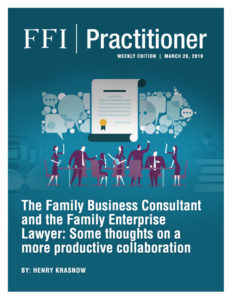
View this edition in our enhanced digital edition format with supporting visual insight and information.
Have the contributions that lawyers can make to family governance discussion been undervalued? So says this week’s contributor, Henry Krasnow, in a thought-provoking piece exploring how family business consultants can collaborate more productively with the company’s attorney.
Frequently the family business literature speaks about family governance in terms of various behavioral science theories that help in meeting the challenges presented by complicated relationships among family members who are owners, family members who are not owners, the children of both, nonfamily managers, and members of the board of directors.
However, little is said or written about the contributions that can be made to the governance discussion by perceptive lawyers, who, although having different training and perspectives from their behavioral science colleagues, can make valuable contributions to improve governance structures and the surrounding conversations.
For example:
- Lawyers have accumulated valuable insights regarding the advantages and expected disadvantages of various governance structures and documents. These insights are the result of experiences from their own work when seeing how various governance structures and documents can, or cannot, contribute to avoiding or creating disputes — as well as how these documents will be interpreted if a conflict arises. Poorly drafted documents often fail to resolve common disputes regarding who administers the documented agreement, who is to make what decisions regarding the operations of the company, and/or what has been agreed to in the first place.
For instance, whether decisions will be made by the founder or, if the founder has died or retired, by the owner who is then both President and owner, for specific decisions such as the sale of the company or purchase of another company. Who has what veto powers and, if so, over what decisions? Often, certain owners are denied decision-making powers, resulting in anger and resentment that is frequently manifested in destructive ways. Lawyers have experience that can devise win-win compromises to avoid these situations and persuade those involved of the wisdom of adapting these compromises. At a minimum, the company lawyers should provide documents that clearly and unambiguously state what was agreed to and what was intended.
- Lawyers can assist owners and other family members to have additional agreements in place regarding succession, especially with regard to events that arise when owners die or get divorced. Death and divorce almost always result in the transfer of assets, and these assets will, without appropriate planning, include shares or other ownership interests in the family business. It is critical that appropriate agreements are in place (e.g., agreements that protect ownership from being transferred in divorce) to ensure that, in the event of an untimely or unexpected death, ownership is transferred or inherited by the intended people, and that the transfer does not require the payment of potentially huge amounts of unnecessary estate or inheritance taxes. Such unanticipated events can immediately destroy value or, over time, erode value and governance structures by inhibiting the ability to govern the company effectively.
In my opinion, it is very unwise for family business consultants not to ensure that everyone in an ownership position in the company has an estate plan that covers what will happen to his or her ownership interest if he or she should die — or that there are agreements among the owners that give appropriate people the right to buy back stock that a judge may order to be transferred to non-family members who have become divorced from their former family member spouse. In every estate plan, even those for family members who are relatively young, an obvious need is that the Will (or Trust) of every owner (or prospective owner) provides for the transfer of the ownership interests to his or her heirs in a way that furthers the succession plans the family had agreed to.
- Although family business consultants are almost never involved in the business’ cash management practices, a much-overlooked fact remains that CASH is almost always KING, and many interpersonal and business problems are caused by limited cash. One of the most difficult interpersonal problems is caused by the company’s failure, because of insufficient cash flow, to make an expected distribution of profits to owners who may budget to live off these distributions. Finding a cure for this problem is not in the realm of the problems a family business consultant is expected to address, but it is something he or she should be aware of and can be involved in persuading ownership to take the steps necessary to finding a remedy. Often, the insights of sophisticated tax lawyer in reducing taxes, thus increasing available cash can solve serious interpersonal problems in ways a consultant cannot. These lawyerly skills are not limited to income taxes, but also to reducing or avoiding inheritance and estate taxes which, if one of the major owners of a valuable corporation dies, can create cash needs that inhibit the working of the company. Notably, these skills are not held by all lawyers or accountants. The difference in the ability to solve these problems between a sophisticated or creative tax lawyer and a general business lawyer or accountant can be huge in terms of dollars saved and cash being made available.
And, yet, even after understanding and recognizing what lawyers contribute, it should not be forgotten, and should be well understood, that documents, unlike people, are NOT all created (or written) equal. Some are complete, anticipate future problems, and are written in nonambiguous language. Some are very incomplete, do not deal with anything other than current problems (which like everything change over time), and are ambiguous and confusing. Documents drafted by a lawyer that contain arcane, formal, seemingly “legal’ (but unintelligible) language may look impressive but a writing style like this often serves to hide the fact that the document was not well drafted.
Understandably, many family business consultants might be thinking, “Yes, I know the value that good, thoughtful lawyers can offer, but what can I do if the company’s lawyers are not up to par?” Certainly, when a family or company already has a relationship with a lawyer (who may not be delivering insightful, thoughtful and competent advice and clearly-written documents), the consultant is in a difficult position. Criticizing the company lawyer might end up as a nowin proposition and result in the destruction of the relationship of trust that the consultant is trying to build.
Undoubtedly, there is a real risk that the relationship of the consultant to the company will be harmed by creating an enemy of the lawyer — after all, it is not unusual for the owners to have a long-standing relationship with the company lawyer that is more trusting than the relationship with the consultant. Nonetheless, the consultant’s job and contribution should not be limited or compromised by a less than fully competent company lawyer who may already be in place.
Of course, providing input for the family enterprise as to the skills of the company lawyer is valuable and should be done. The unfortunate reality is that all the work and value provided by a consultant can, and sometimes will, be put in jeopardy by a lawyer who is not aware of the nuances of the multi-generational company and the complicated relationships that are entailed.
There is no easy solution for this problem, but family business consultants, more than those in other professions, have the training and interpersonal skills to devise tactful and effective ways to both introduce the problem and to solve it.
Disclaimer: The views expressed in this article are those of the author only. The information contained in this article is provided solely for informational purposes. This article does not constitute legal advice or create an attorney-client relationship.
About the Contributors
 Henry Krasnow is a business lawyer who develops strategies designed for entrepreneurial, family, and privately held business. He is the author of the book “Your Lawyer: An Owner’s Manual” and a partner at Sugar Felsenthal Grais & Helsinger LLP. In addition, Henry is an FFI Fellow, recipient of the FFI Interdisciplinary Award, a member of the former Body of Knowledge Committee (BOK) and a past chair of the FFI Practitioner Editorial Committee.
Henry Krasnow is a business lawyer who develops strategies designed for entrepreneurial, family, and privately held business. He is the author of the book “Your Lawyer: An Owner’s Manual” and a partner at Sugar Felsenthal Grais & Helsinger LLP. In addition, Henry is an FFI Fellow, recipient of the FFI Interdisciplinary Award, a member of the former Body of Knowledge Committee (BOK) and a past chair of the FFI Practitioner Editorial Committee.
About Sugar Felsenthal, Grais & Helsinger,LLP
Founded in 1981, Sugar Felsenthal, Grais & Helsinger,LLP serves as trusted advisors to their clients, combining personal service with business and legal acumen.

View this edition in our enhanced digital edition format with supporting visual insight and information.




